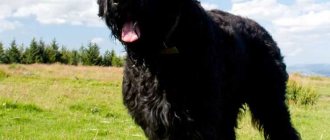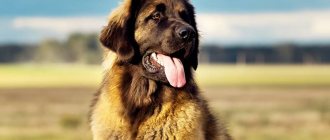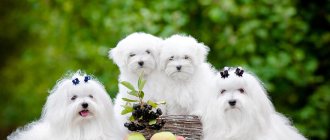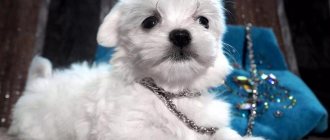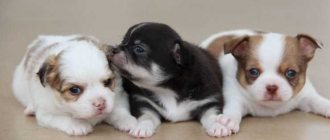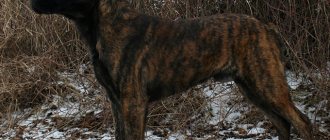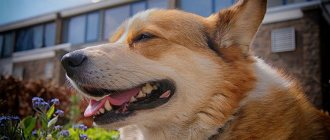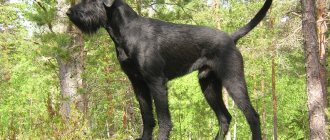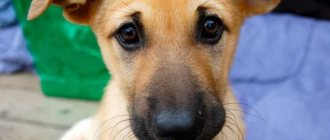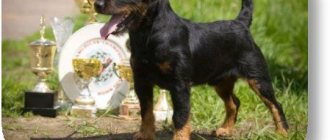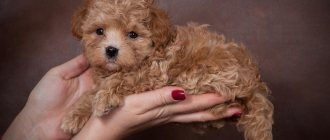- Leonberger
Leonbergers are friendly giants with a calm and even-tempered nature. This is an excellent family dog that gets along well with all family members and other animals. They respond well to training. If necessary, they will notify their owners if strangers are detected, but this is not a guard dog.
- Country of origin : Germany
- Height at withers : female: 65–75 cm, male: 72–80 cm
- Weight : female: 41–59 kg, male: 48–75 kg
- Lifespan : 9-11 years
- Use : companion dog
Purchasing a Leonberger puppy is a responsible and important action that you need to think carefully about before you do it. This is especially true for those people who are going to become truly responsible dog breeders. The question of choice should be approached carefully and without haste, comparing your own habits, daily routine and the nature of the chosen breed. When the future owner has decided on the breed, a new dilemma arises: how to find a bona fide breeder? Here you need to be extremely careful not to become a prematurely disappointed dog owner.
Buying a Leonberger puppy is a very exciting event, because you can say that a new family member will appear. To ensure that the event does not overshadow anything, it is worth taking a responsible approach to choosing a breeder. There are no bad dog breeds; you can simply run into an unscrupulous breeder for whom money comes first. The future owner is at great risk of buying an animal that has a lot of health problems. It is for this reason that you need, first of all, to get to know the breeder well, read reviews about him and the like.
Origin story
Undoubtedly, you will be interested to know how this amazing breed - Leonberger - appeared. At the end of the 19th century, in the German city of Leonberg (Lion City), the head of the municipality, who adores animals and his hometown, decided to combine these two feelings into one - to create a lion dog as a symbol of the city, the coat of arms of which depicts the king of beasts.
To begin with, he crossed a St. Bernard and a black and white Newfoundland. As a result, unusual puppies appeared. Subsequently, the blood of another large breed of Pyrenean mountain dog was infused into the breed. This is how the Leonberger was bred, which initially had a silver-gray coat. And only decades later the breeder managed to achieve a yellow-red color and a black mask.
These dogs were admired, noble people of Germany kept them, and puppies were given as expensive gifts to representatives of other powers. However, the breed also had its downfalls, when the canine world did not take this breed seriously. During the Second World War, breeding breeders were on the verge of extinction. And only in the 70s of the last century the population was restored. This breed appeared in Russia in 1989.
Description of the Leonberger breed
A Leonberger dog gives a feeling of power at first sight. This large, proportionally built dog is indeed very strong and was once even used to transport heavy loads. But for all its bulkiness, it is very dexterous, agile and flexible. To get to know the breed better, let's look at the breed description together:
- The height of an adult Leonberger male at the withers is 72-80 cm, females – 65-75 cm;
- the Leonberger's weight ranges from 41 to 75 kg, with males being much larger than females;
- the head is large with medium-sized ears that hang down to the cheeks;
- eyes dark to light brown, although dark is preferred;
- the eyelids fit tightly to the eyeball; the expression of the eyes is thoughtful and reasonable;
- a dog is supposed to have 42 teeth, but with the possible exception of the absence of molars (M3); The dog has a scissor bite;
- body with a flat back and sloping loin, but in no case humpbacked or arched;
- the paws are smooth and powerful, stronger in a male than in a female;
- the dog’s movements when running are powerful and sweeping;
- the tail is lowered and curled, and when moving it should not rise above the back;
- the coat has a thick undercoat, very soft, without parting, can be smooth or slightly wavy; there are “pants” on the hind legs, and a mane on the chest and neck, which makes the dog look like a lion.
Leonberger breed colors
Leonberger has a wide range of red colors - from light sand to dark red - there are a lot of variations. The main thing that the breed standard says is that the dog’s coloring should not contain gray or brown. Also, the breed is not characterized by zonal coloring. The Leonberger also has a so-called “mask”, which covers the head and partially extends to the shoulders. This is a darkening of red fur with black color.
The Leonberger may have white fur on its chest, but not more than a palm in width. The dog may also have individual white hairs on its fingers. In order for your pet's fur to always look great, it needs regular care in the form of combing.
Important! If a dog's mask is incomplete or missing altogether, this is a disqualifying fault for the breed.
Dog kennel "Like Vizhe Trel". Tibetan Mastiff, Leonberger
| Description: | The kennel is engaged in breeding the following breeds: Tibetan Mastiff & LeonbergerBreeder in the breeds since 2004.* Priorities in breeding* The breeding program of our breeds is focused on selective admission to breeding use of Tibetan Mastiffs and Leonbergers that meet the standard: correct in appearance, healthy dogs physically, mentally and genetically .* Our founders of breed lines are sires purchased in TOP nurseries from well-known breed lines and are of interest for the future development of breeds. *All our Tibetan Mastiffs and Leonbergers have full FCI pedigrees. * We do not set ourselves the goal of mass matings for statistics, we are not content with the fact that our Tibetan Mastiffs and Leonbergers fulfill the minimum requirements for admission to breeding, but we deliberately approach the compilation of combinations of sires, according to the principle: The Best with the Best, taking into account the genetic heritage, so that get promising, healthy puppies that meet the standard. * We strictly adhere to all the recommendations of the “RKF Regulations on Pedigree Breeding”. * In breeding we use both our own and foreign high-breed Tibetan mastiffs and Leonbergers that meet the requirements of the FCI standard, with good character, adequate psyche (we have the RKF Test - T1) , with an excellent exterior, in good health: Examined for hip and joint dysplasia, genetically hereditary diseases of the eyes, thyroid gland, etc. Diseases. All dogs have official, documented conclusions and international certificates. * We strive to consolidate in our puppies the best qualities of famous dogs, famous breeding lines of Tibetan Mastiffs and Leonbergers. * We cooperate with famous breeding nurseries in Russia and abroad. * We keep dogs and raise puppies outside the city, in an ecologically clean area. * We recommend individual selection of puppies for potential owners: Show - Pet - Breder - classes. We reserve. We provide consultations to owners of puppies of our breeding on issues of feeding, education, maintenance, breeding and veterinary care. * Our Tibetan Mastiffs and Leonbergers and many graduates of the kennel take part in exhibitions. They have titles of the RKF and cynological federations of other countries. ***** They will not betray. They won't throw you away. They won’t set you up and they won’t take revenge on you in any way, they won’t leave you in trouble. They won’t leave you to die. Learn to LOVE, People, from DOGS!!! |
| Contacts: | 8-915-774-15-60 |
Leonberger character
Despite the fact that the Leonberger is an unrivaled guard, it is not characterized by aggressive behavior. He is important and imperturbable, and with just his intimidating appearance he is ready to scare away an intruder without using his teeth. A flexible psyche allows you to adapt to any owner.
Important! The manifestation of aggression in this breed is equal to the disqualification of the dog.
Leonberger tenderly cares for children of any age, taking care of them. But this applies only to an adult dog, but large puppies of this breed, on the contrary, are dangerous for the baby, because they can unintentionally drop him or try him on the tooth. So, when taking a puppy into a home with a small child, you need to not leave the kids alone and not allow them to interact closely.
But rest assured that, despite its good nature, the Leonberger will protect its flock and its territory from any danger. With him you don’t have to worry about the safety of the property entrusted to him or your own safety. What is characteristic is that this breed is distinguished by its complete equanimity to loud sounds - gunshots, thunder, hail, even without special training.
Important! People are wrong when they doubt whether you can handle such a large dog. The Leonberger is a dog that does not seek dominance; it is happy to serve its owner and follow his orders. The dog will never challenge him for primacy in the family.
Leonberger diet, what dog food to choose
Rapid growth, a sensitive stomach, long-term skeletal development, as well as a slow metabolism - these factors must be taken into account when preparing the Leonberger's diet. As a rule, a puppy is taken away from the breeder when it is completely fed on its own.
The Leonberger can be fed both dry food and natural food.
Typically, breeders feed puppies with ready-made food, and there is no reason to change the brand of food in the first two weeks after purchasing a baby. This will allow him to maintain normal digestion in the stressful situation of adapting to a new home.
If you plan to continue giving your pet ready-made food, then for up to a year, complete food for puppies, brands “Pro PLAN”, “Bozita” or “Pronature”, is given. They contain enough substances for the proper formation of the skeleton. After a year, you can switch to food for juniors of the same or other brands.
Junior foods contain more protein, the concentration of minerals in them is slightly lower than in children's foods. Excellent junior lines in Royal Canin and Happy Dog food. An adult dog can eat regular food for large dogs, which contains chondoprotectors to protect the joints. Any dry food is better absorbed if you fill it with warm water a few minutes before feeding.
Natural menu
Natural food is a good alternative to ready-made food, and many Leonbergers who suffer from poor appetite are happy to eat meat or offal flavored with porridge, vegetables and vegetable oil. During the growth period, puppies must be given gelatin for ligaments and vitamin supplements.
The Leonberger's slow metabolism is the result of its economical expenditure of energy. Usually the dog just lies there, enjoying the views of the surroundings, or sleeps. He readily accepts the invitation to play, but as soon as the game ends, the dog lies down again.
As a result, the Leonberger, whose size is enormous, spends little energy and the dog does not need a large amount of food to maintain normal condition. It is worth dividing the daily dose of food into three parts and feeding your pet in small portions. This will help not stretch the stomach and avoid gastric volvulus, which is common in the breed.
Leonberger training
You will probably be wondering whether this breed can be trained or whether you can rely on its natural intelligence. Of course, this dog has a good character, but this does not mean that the dog will be perfectly obedient both at home and on a walk, not to mention at exhibitions with large crowds of people. Socializing a dog takes the most effort and time. The dog must react neutrally to pets, strangers, and vehicles.
Important! If you plan to train your Leonberger as a watchdog, then you need to start training as early as possible. 2-3 months is the ideal age.
Punishment is unacceptable when raising this proud dog. Yes, it won’t be needed, since the dog is smart by nature and dreams of pleasing its owner. So for training you need to use affection and treats.
Care and maintenance
Caring for a Leonberg is no more difficult than caring for any other large dog. The dog needs to have a place where he can rest. In a private house it is good if it is an aviary. It's important that this big ball of fur gets plenty of exercise throughout the day. This is beneficial for the musculoskeletal system and his mood. If this is not possible, then the dog will be depressed and inactive all the time, which in turn will sooner or later lead to illness.
The Leonberger's coat and undercoat are very thick, so hair on the floor and furniture cannot be avoided. To minimize its amount and keep the animal’s coat beautiful, you should comb it every two days with a slicker brush and a special rubber glove.
Important! In addition to its place, leash and collar, the dog needs proper nutrition, timely vaccinations and a visit to the veterinarian.
Health of the Leonberger breed
Leonberger owners or those who are still planning to own this wonderful breed are, one might say, lucky. Dogs are not susceptible to frequent diseases and are not afraid of hypothermia. But they still have a disease that can be transmitted at the genetic level - hip dysplasia. It is incurable, but if detected at an early age, it can be corrected. To do this, the dog is not given large physical loads, but instead is allowed to swim a lot, and in winter to walk in deep snow.
Arthritis is common in older dogs, as is the case in many large breeds. Throughout the entire period of life, you should monitor your pet’s diet - overeating, eating junk food, swallowing food too quickly provokes painful bloating. It can be deadly. In case of illness, the dog is given a gas tube, and in critical situations, the gastric wall is punctured to release gases.
Important! The life expectancy of this breed is short. She is measured to be only 8-10 years old
Cane Corso dog kennel Corso Bella Bravo. Cane Corso Chinese Crested Leonberger
Take the Attention Test! Find 10 differences! (click right here!)
Find the answer Are you bothered by some problem or question? Enter “Breed” or “Name of the problem” into the form, press Enter and you will find out everything about the issue that interests you.
https://dog-care.ru/porody/pitomniki/sobak-leonberger-v-moskve.html
| Description: | The Corso Bella Bravo kennel breeds the Cane Corso Italiano breed. Founded in 2000, although the first dogs were purchased in 1997, and the first Cane Corso litter was received in 1999. This became the basis of the nursery's livestock. Work in the kennel is based on professionalism and strict selection of Cane Corso producers. All our dogs have excellent breed type, stable psyche, good health and first-class working qualities. The owner of the nursery is Kharchenko Tatyana - zoologist, expert dog handler, specialist in organizing breeding business |
| Contacts: | (495) 387-69-41,8-916-352-4793 |
What to feed your Leonberger
Attention! There is no need to think that such a large dog as the Leonberger needs huge amounts of food. Due to the slow process of digesting food, they require it infrequently and little by little. Overeating has an extremely negative effect on gastric motility, joints and leads to obesity. Therefore, the diet should not be so high in calories, but rich in beneficial microelements and vitamins.
- Babies who are taken away from their mother (and this usually happens at 1 month) can be fed with milk, it’s good if it is goat’s milk. A little later, porridge is cooked on it, gradually reducing the amount of milk and replacing it with water.
- Puppies 2-3 months old should be fed 5-6 times a day. The diet should mainly consist of liquid porridge with meat, kefir, cottage cheese and quail eggs. Boiled vegetables are required as a separate dish or along with porridge. Chicken egg white is extremely undesirable.
- At six months you can give food 3-4 times a day while maintaining the diet. An older puppy should be given raw cartilage for the proper formation of joints, as well as boiled fish fillets.
- By the age of one year, there are only two feedings left - in the morning, after a walk and in the evening.
It is recommended to feed an adult dog:
- boiled sea fish;
- offal;
- meat and large beef bones;
- all kinds of seasonal vegetables, except cabbage;
- porridges from any cereals, except legumes, preference for rice and oatmeal;
- kefir, buttermilk.
In more detail - what to feed an adult dog In addition to natural products, a dog of this breed can successfully eat premium dry food. You should buy them only from trusted sellers. For babies from two months old, canned food is recommended, and at the age of six months they can be switched to dry food.
Important! Under no circumstances should you give your dog sweets, smoked or salty foods - this is poison for the animal.
The first thing to do
Plan when you will take your dog for vaccinations. Bring toys for him to play with. Prepare a place and train your pet to this place. Necessary things:
- Dry food,
- clothes,
- Shampoo,
- Oral hygiene product,
- Brush (comb),
- Claw clipper.
If you want to add your organization, fill out the form below: Indicate the name of the nursery, its description and provide contact information. We will be glad to add you to our directory.
Leonberger photo
It is impossible with the help of a photo to convey all the grace and good nature of the Leonberger. It is best to chat with him live in order to fall in love with this breed forever.
Health status and life expectancy
Unfortunately, Leonbergers, like most giant breeds, have very short lives. A seven-year-old dog is considered a very old man, and only long-livers overcome the ten-year mark. Long development, early aging - these factors force owners to carefully and meticulously control all aspects of their pet’s life in order to avoid diseases.
Leonbergers can suffer from joint dysplasia, entropy and Addison's disease.
The Leonberger, like many breeds bred through inbreeding and infusion of blood from other breeds, has hereditary diseases:
- Hip dysplasia. Occurs in approximately eleven percent of dogs, but may be present in a subtle form in untested animals.
- Entropy. Entropion is a serious problem, so dogs with this pathology are excluded from breeding.
- Addison's disease. A disease of the adrenal glands, characterized by vomiting, diarrhea, and weight loss.
In addition to hereditary diseases, Leonbergers are predisposed to bone cancer, which is most often diagnosed after seven years of age.
Reviews about the Leonberger breed
Alexander: “I first came across the Leonberger breed at a dog show and took the risk of trying to get this giant at home. Over the years of communicating with my dog, I have never regretted my impulse.”
Alina: “Those who live in an apartment, especially a small one, should not have this breed. We didn't know about this. As a result, we had to move into the house. So our Shah became an incentive for the family to improve their living conditions.”
Edward: “I am a breeder of the wonderful Leonberger breed, I have my own professional nursery. I can say with responsibility that a better breed simply cannot be found, and the owners’ reviews about this dog are the most positive.”
How to choose a puppy and which nursery to buy from
When choosing a Leonberger, it is imperative to take into account that males are much more courageous, larger and stronger than females. It is easier to deal with a bitch; they are softer in character and calmer. In addition to choosing the gender, the owner must decide whether he will exhibit his dog at exhibitions or participate in breeding work. This is necessary in order to purchase a puppy with the prospect of a show career. Usually the mating of Leonbergers is planned long before the estrus, and the owners of the bitch can pick and choose a suitable male.
Leonberger babies are large, big-headed puppies with a typical coloring and large, floppy ears. They should have large, thick paws with no signs of bowing or markings, a normal bite and a strong, robust body. The eyes are clean, without tear tracks and red, inflamed eyelids.
Puppies that are weak, have an unsteady gait, stiff or strange movements, are very timid or indifferent may be sick or suffer from mental disorders. There is no need to take very small, as well as very large, too fat puppies. A small, narrow-boned puppy will grow into a small dog, and a fat baby may suffer from joint problems in the future.
The Leonberger breed has recently become famous in Russia, but several breed clubs have already been formed.
The main population of Leonbergers is kept in specialized nurseries, where the best representatives of the breed are presented:
- In Russia: nursery “Amicus Optimus”, website https://amicusoptimus.ru, cost from $700.
- In Moscow: nursery “Galkino Gnezdo”, website https://izgalkinagnezda.leonberger.ru, cost from $900.
- In St. Petersburg: nursery “LEO VON ZARENDORF”, website https://leonbergerspb.com, cost from 1200 dollars.
- In Ukraine: nursery “Zoryanyi Chaklun”, website https://www.chaklun.com.ua, cost from $800.

